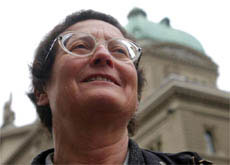
Women to keep vigil outside parliament

Swiss women began a vigil outside parliament on Monday in protest against their lack of representation in government.
“Women’s Vigil” aims to have at least one woman permanently on site until December 10 – the one-year anniversary of the cabinet elections.
The protest is the brainchild of Yvette Barbier, a doctor from Lausanne, who was spurred into action by the election result which saw Ruth Metzler of the centre-right Christian Democrats ousted from the seven-strong cabinet.
This left just one woman in government: the centre-left Social Democrat, Micheline Calmy-Rey.
Thousands of Swiss women took to the streets of the capital, Bern, incensed at what they saw as an inadequate representation of women in government.
There was further anger over Metzler’s replacement: Christoph Blocher of the rightwing People’s Party.
His party has come out against issues such as statutory paid maternity benefit – a key campaign issue for women’s rights groups.
“Before the election, younger women thought women’s rights were recognised [in Switzerland],” Barbier told swissinfo. “But many of them were shocked last December and realised there was still a great need to defend their rights.”
Low key
Barbier says she wanted to find a way of making their voices heard that would appeal to women who did not like the idea of large street protests.
“I had the idea that in our society women do a lot of night duty, such as looking after children or working in hospitals, and many of their efforts are unrecognised,” she said.
“So if only two more of them did a sort of guard duty in front of parliament, their protest would become more visible.”
She added that a longer-term protest might also have more of an impact than a mass demonstration, which normally only lasts for a few hours.
“This time we will not go back to cook dinner, we will remain.”
Creative ideas
Although women must commit to the full 24 hours – they can, however, arrange to share the shift with friends – Barbier is confident that volunteers will be able to organise their work and private lives around the vigil.
“It shouldn’t be too difficult for them to come up with one day between March and December,” she said.
Barbier says she has already received some interesting ideas from those willing to take part.
One woman wants to do the vigil with her daughter in order to promote dialogue between the generations. Meanwhile, a writer plans to come and read poetry, while a musician wants to perform a concert during her shift.
According to Barbier, men are also welcome to join in – as long as they support women’s rights.
Positive discrimination
A report published earlier this month by the Inter-Parliamentary Union found that Switzerland ranked 25th in the world in terms of women parliamentarians.
According to the IPU, women fill 24.8 per cent of parliamentary seats in Switzerland. The global average is 15 per cent.
Barbier’s ultimate aim is to see another woman in the Swiss government. However, she does not think this should be achieved by setting a quota.
“I see women doing so many important things in our society that we urgently need to have a platform where they can express their concerns,” she said.
“Through this movement we will reopen a general discussion on women’s rights and I hope this will ultimately bring more women into politics.”
swissinfo, Joanne Shields
The Women’s Vigil will take place from March 8 (International Women’s Day) until December 10.
The idea is to have at least one woman outside the parliament building in the capital, Bern at all times throughout this period.
Organiser Yvette Barbier estimates that at least 1,000 people are needed in order to maintain the vigil for the entire period.

In compliance with the JTI standards
More: SWI swissinfo.ch certified by the Journalism Trust Initiative

























You can find an overview of ongoing debates with our journalists here . Please join us!
If you want to start a conversation about a topic raised in this article or want to report factual errors, email us at english@swissinfo.ch.